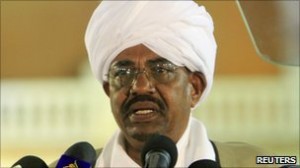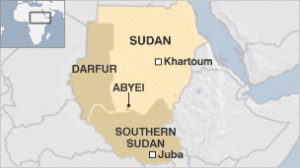
Sudanese President Omar al-Bashir is to visit the capital of Southern Sudan, Juba, five days before a referendum is held on whether it will secede.
Mr Bashir will meet the president of the semi-autonomous south, Salva Kiir. The two men were on opposing sides during the two-decades-long civil war.
The referendum was part of the 2005 peace deal that ended the conflict.
Officials say almost 4 million people have registered to vote on Sunday, more than 95% of them in Southern Sudan.
Others have signed up in northern Sudan and eight countries abroad.
Split ‘almost certain’
The BBC’s James Copnall in Khartoum says Mr Bashir and Mr Kiir will have much to discuss during their meeting in Juba.
The referendum is seen by many as a possible source of tensions between Northern and Southern Sudan.
The North hates the idea of the oil-rich South splitting away, and both sides have yet to reach an agreement on a number of post-referendum issues, including on citizenship and resources, such as oil, our correspondent says.
Mr Bashir may even address a rally, though as late as Monday night his aides were not sure if this would happen, he adds.
Normally, the president would be expected to use an opportunity like this to urge Southerners to vote for unity in the referendum.
But, our correspondent says, senior Northern officials have started to say publicly what many have believed for years – the South is almost certain to split away.
So this is almost certainly the Sudanese head of state’s last trip to Juba before the region decides to secede, he adds.
Southern Sudan has been marginalised by a secession of governments in Khartoum, from colonial times onwards. The North and South are also divided by culture, religion, ethnicity and a history of conflict.
US ‘optimistic’
On Monday, a spokesman for the Southern Sudan Referendum Commission (SSRC), Chan Reec Madut, said it was “100% prepared”.
Some training still needed to be carried out and there were still problems with access to polling stations in remote areas, he said. But he insisted that those would not affect the vote.
“Our people are ready to walk for six hours, eight hours, in order to reach their polling centres,” he said.
Mr Madut added that the commission was also struggling to secure promised funding from Khartoum, but that he was confident the government would “still deliver on its pledges”.
 There had been concerns that Sudan’s poor infrastructure and political instability might delay the referendum, risking an outbreak of violence.
There had been concerns that Sudan’s poor infrastructure and political instability might delay the referendum, risking an outbreak of violence.
For the vote to be considered valid, 60% of voters must take part.
A spokesman for the US state department, PJ Crowley, said it was optimistic about Sunday’s referendum, and that both sides appeared to agree that it should be an open and credible process.
A spokesman for the US state department, PJ Crowley, said it was optimistic about Sunday’s referendum, and that both sides appeared to agree that it should be an open and credible process.
“Certainly [we] and the observers in Sudan have viewed the registration process as very credible and we believe that the right signals are being sent both in the north and south in terms of the upcoming referendum and respecting the result,” he said.
But Mr Crowley noted that both sides remained split on key issues, including border demarcation, the disputed Abyei region, and the sharing of oil revenues.
“The environment, we think, is constructive leading into this weekend. But we understand there are still many unresolved issues,” he added.
Both US special envoy Scott Gration and Princeton Lyman, a diplomat who has helped negotiations between north and south, will be in Sudan.

Leave a Reply
You must be logged in to post a comment.